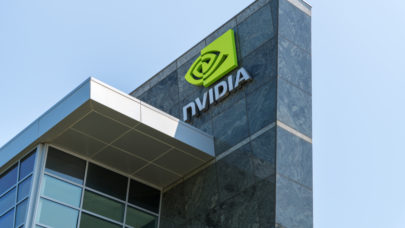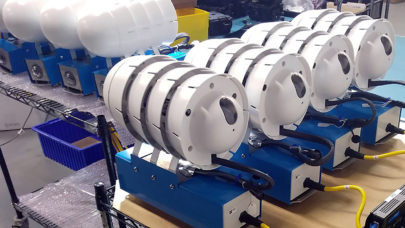
Nvidia, Qualcomm Shine in MLPerf Inference; Intel’s Sapphire Rapids Makes an Appearance.
September 8, 2022
The steady maturation of MLCommons/MLPerf as an AI benchmarking tool was apparent in today’s release of MLPerf v2.1 Inference results. Twenty-one organization Read more…

At GTC22, HPC and AI Get Edgy
March 30, 2022
From weather sensors and autonomous vehicles to electric grid monitoring and cloud gaming, the world’s edge computing is getting increasingly complex — but the world of HPC hasn’t necessarily caught up to these rapid innovations at the edge. At a panel at Nvidia’s virtual GTC22 (“HPC, AI, and the Edge”), five experts discussed how leading-edge HPC applications... Read more…

Edge to Exascale: A Trend to Watch in 2022
January 5, 2022
Edge computing is an approach in which the data is processed and analyzed at the point of origin – the place where the data is generated. This is done to make data more accessible to end-point devices, or users, and to reduce the response time for data requests. HPC-class computing and networking technologies are critical to many edge use cases, and the intersection of HPC and ‘edge’ promises to be a hot topic in 2022. Read more…

The Case for an Edge-Driven Future for Supercomputing
September 24, 2021
“Exascale only becomes valuable when it’s creating and using data that we care about,” said Pete Beckman, co-director of the Northwestern-Argonne Institute of Science and Engineering (NAISE), at the most recent HPC User Forum. Beckman, head of an Argonne National Laboratory edge... Read more…

Chameleon’s HPC Testbed Sharpens Its Edge, Presses ‘Replay’
July 22, 2021
“One way of saying what I do for a living is to say that I develop scientific instruments,” said Kate Keahey, a senior fellow at the University of Chicago a Read more…

Microsoft, HPE Bringing AI, Edge, Cloud to Earth Orbit in Preparation for Mars Missions
February 12, 2021
The International Space Station will soon get a delivery of powerful AI, edge and cloud computing tools from HPE and Microsoft Azure to expand technology experi Read more…

SODALITE: Towards Automated Optimization of HPC Application Deployment
May 29, 2020
Developing and deploying applications across heterogeneous infrastructures like HPC or Cloud with diverse hardware is a complex problem. Enabling developers to Read more…
Uncertainty Plagues Chip Foundries, HPC Sector
March 23, 2020
Semiconductor market analysts are divided in their assessments of how long and widespread will be the impact of the coronavirus on global foundry revenues and f Read more…

- Click Here for More Headlines

Whitepaper
Transforming Industrial and Automotive Manufacturing
In this era, expansion in digital infrastructure capacity is inevitable. Parallel to this, climate change consciousness is also rising, making sustainability a mandatory part of the organization’s functioning. As computing workloads such as AI and HPC continue to surge, so does the energy consumption, posing environmental woes. IT departments within organizations have a crucial role in combating this challenge. They can significantly drive sustainable practices by influencing newer technologies and process adoption that aid in mitigating the effects of climate change.
While buying more sustainable IT solutions is an option, partnering with IT solutions providers, such and Lenovo and Intel, who are committed to sustainability and aiding customers in executing sustainability strategies is likely to be more impactful.
Learn how Lenovo and Intel, through their partnership, are strongly positioned to address this need with their innovations driving energy efficiency and environmental stewardship.
Download Now
Sponsored by Lenovo
Whitepaper
How Direct Liquid Cooling Improves Data Center Energy Efficiency
Data centers are experiencing increasing power consumption, space constraints and cooling demands due to the unprecedented computing power required by today’s chips and servers. HVAC cooling systems consume approximately 40% of a data center’s electricity. These systems traditionally use air conditioning, air handling and fans to cool the data center facility and IT equipment, ultimately resulting in high energy consumption and high carbon emissions. Data centers are moving to direct liquid cooled (DLC) systems to improve cooling efficiency thus lowering their PUE, operating expenses (OPEX) and carbon footprint.
This paper describes how CoolIT Systems (CoolIT) meets the need for improved energy efficiency in data centers and includes case studies that show how CoolIT’s DLC solutions improve energy efficiency, increase rack density, lower OPEX, and enable sustainability programs. CoolIT is the global market and innovation leader in scalable DLC solutions for the world’s most demanding computing environments. CoolIT’s end-to-end solutions meet the rising demand in cooling and the rising demand for energy efficiency.
Download Now
Sponsored by CoolIT
Advanced Scale Career Development & Workforce Enhancement Center
Featured Advanced Scale Jobs:
HPCwire Resource Library
HPCwire Product Showcase
© 2024 HPCwire. All Rights Reserved. A Tabor Communications Publication
HPCwire is a registered trademark of Tabor Communications, Inc. Use of this site is governed by our Terms of Use and Privacy Policy.
Reproduction in whole or in part in any form or medium without express written permission of Tabor Communications, Inc. is prohibited.
























